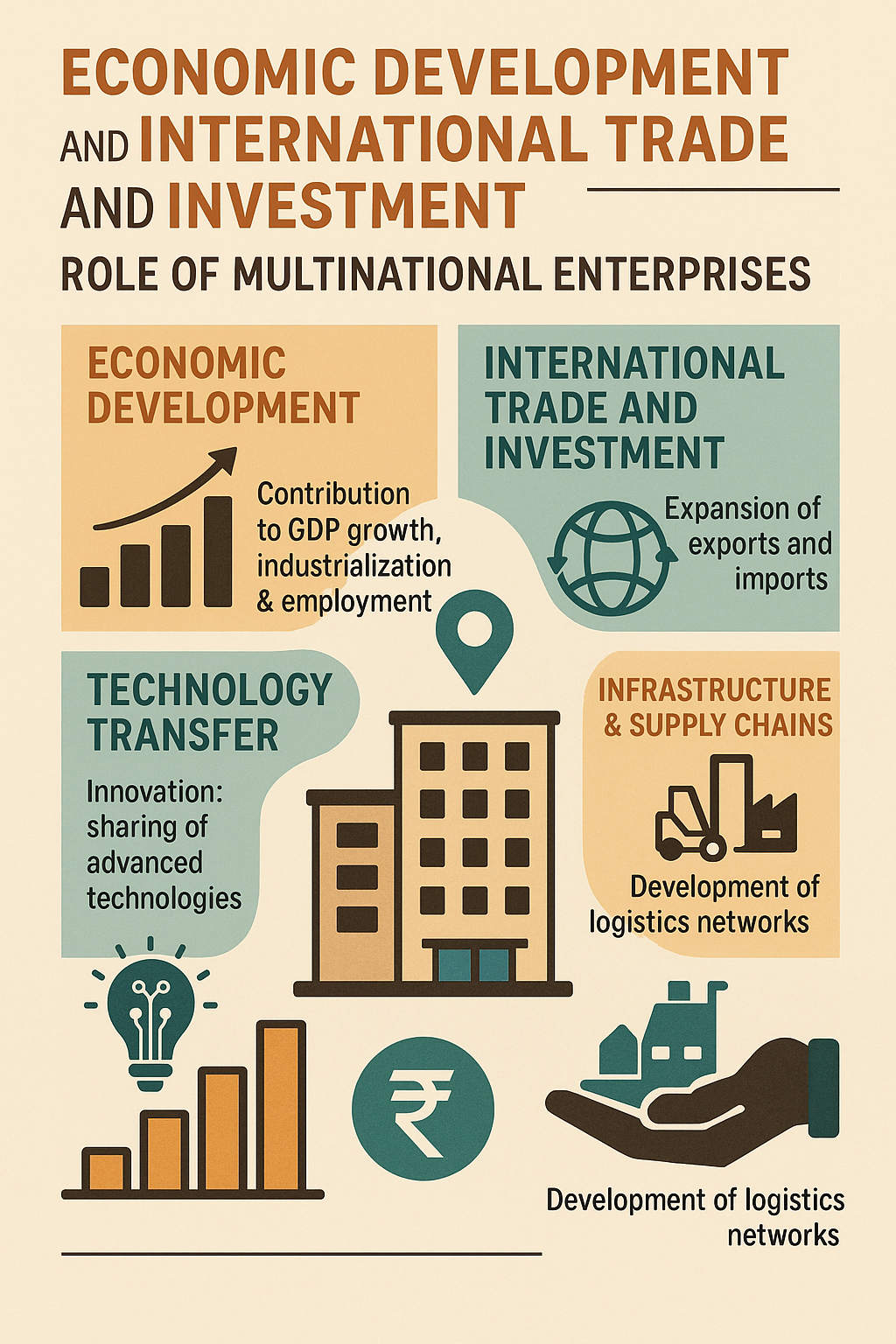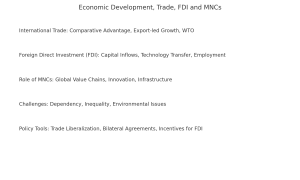
27 Jul Economic Development and International Trade and Investment, Role of Multinational
Economic Development, International Trade and Investment & Role of Multinational Corporations – UPSC Economics Optional Paper 1
In the contemporary globalized world, economic development in less developed countries (LDCs) is increasingly intertwined with international trade, foreign direct investment (FDI), and the operations of multinational corporations (MNCs). This comprehensive note is tailored for UPSC aspirants with Economics optional, focusing on theoretical perspectives, empirical examples, and institutional frameworks like WTO.
📊 Infographic – Economic Development, Trade, FDI & MNCs
econ dev trade fdi mncs full mindmap
🧠 Mind Map – Development and Global Economic Integration

1. Economic Development and Global Integration
Economic development refers to sustained improvements in per capita income, living standards, employment generation, and social indicators. In recent decades, globalization has made international trade and capital flows essential to development strategies of LDCs.
2. International Trade and Development
2.1 Classical and Neoclassical Trade Theories
- Adam Smith: Advocated for free trade based on absolute advantage.
- David Ricardo: Proposed the principle of comparative advantage – countries benefit by specializing in goods with lower opportunity cost.
- Heckscher-Ohlin Theory: Trade is based on differences in factor endowments; countries export goods using their abundant resources.
- New Trade Theory: Emphasizes economies of scale and network externalities (Paul Krugman).
2.2 Trade as an Engine of Growth
- Provides foreign exchange for essential imports
- Expands markets and increases economies of scale
- Encourages technology and knowledge transfer
- Facilitates structural transformation from agriculture to industry
2.3 Export-Led Growth Model
Adopted successfully by East Asian Tigers (South Korea, Taiwan, Singapore), this model emphasizes outward orientation and competitiveness. It allows countries to leapfrog in technology adoption and industrial growth.
3. Foreign Direct Investment (FDI)
FDI involves long-term investment by a foreign entity in productive assets of another country. Unlike portfolio investment, it typically implies control and risk-bearing.
3.1 Benefits of FDI
- Brings capital to capital-scarce LDCs
- Improves employment, skills, and wages
- Transfers advanced technology and managerial practices
- Enhances tax revenues and infrastructure development
- Builds backward and forward linkages
3.2 Types of FDI
- Greenfield Investment: New projects (e.g., Kia Motors in India)
- Brownfield Investment: Mergers or acquisitions (e.g., Walmart’s stake in Flipkart)
3.3 Policy Considerations
- FDI policies, sectoral caps, and ease of doing business
- Incentives like tax holidays, SEZs, PLI schemes
- Protection of domestic industries through screening and regulation
4. Multinational Corporations (MNCs)
MNCs are firms with headquarters in one country and operations in multiple others. They drive trade, investment, and technology diffusion globally.
GS paper 4 syllabus and study plan
GS paper 3 syllabus and study plan
GS paper 2 syllabus and study plan
GS paper 1 syllabus and study plan
4.1 Positive Role of MNCs
- Build industrial infrastructure and supply chains
- Enhance productivity and competitiveness of host economies
- Train human capital through exposure to global standards
- Support CSR activities in health, education, and environment
4.2 Challenges Posed by MNCs
- Repatriation of profits drains foreign reserves
- Can monopolize markets and reduce local competition
- May exploit labor and natural resources
- Undermine national sovereignty through lobbying and influence
4.3 Policy Recommendations
- Ensure local sourcing and technology sharing
- Mandate CSR and ESG compliance
- Strengthen competition laws and labor standards
- Balance FDI attraction with strategic autonomy
5. Role of International Institutions
5.1 World Trade Organization (WTO)
WTO promotes rule-based trade, resolves disputes, and ensures non-discrimination through Most Favored Nation (MFN) and National Treatment (NT) clauses. However, it faces criticism for slow negotiations and favoring developed nations.
5.2 UNCTAD and World Bank
- UNCTAD promotes trade and development for Global South
- World Bank supports infrastructure, education, and financial development
6. Trade-FDI-MNCs Nexus: Synergies and Challenges
Modern development strategies combine trade, investment, and global corporate participation for maximum growth impact. Countries like Vietnam, Bangladesh, and China showcase effective integration of all three elements.
6.1 Risks
- Vulnerability to global shocks and supply chain disruptions
- Over-dependence on foreign capital and demand
- Environmental and social costs of growth
6.2 Developmental Safeguards
- Build domestic capacity and innovation ecosystems
- Use selective protectionism for infant industries
- Invest in education, R&D, and digital infrastructure
- Promote inclusive and sustainable growth
📚 Previous Year UPSC Questions
- Discuss the role of foreign direct investment in the economic development of developing countries. (2019)
- Critically examine the contribution of multinational corporations in the development of Indian economy. (2022)
- Explain the implications of WTO on India’s trade policy. (2020)
🔮 Probable Questions for Upcoming UPSC Prelims and Mains
- How does international trade contribute to structural transformation in developing economies?
- Evaluate the benefits and risks of FDI-led development.
- What are the key policy measures needed to regulate MNCs in India?
- Can globalization lead to inclusive development? Examine with reference to India.




No Comments